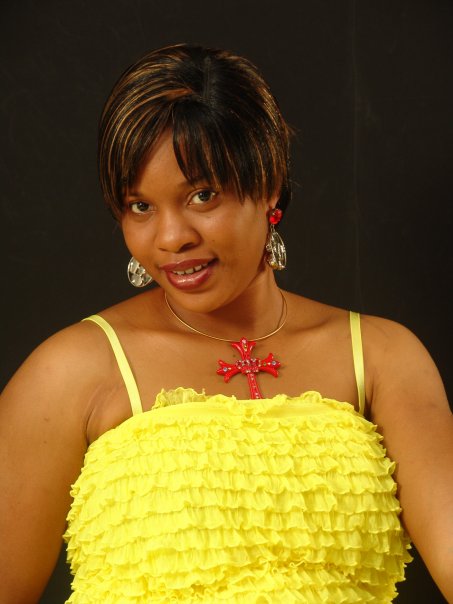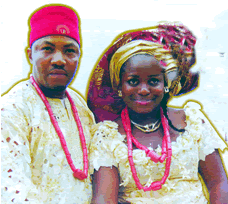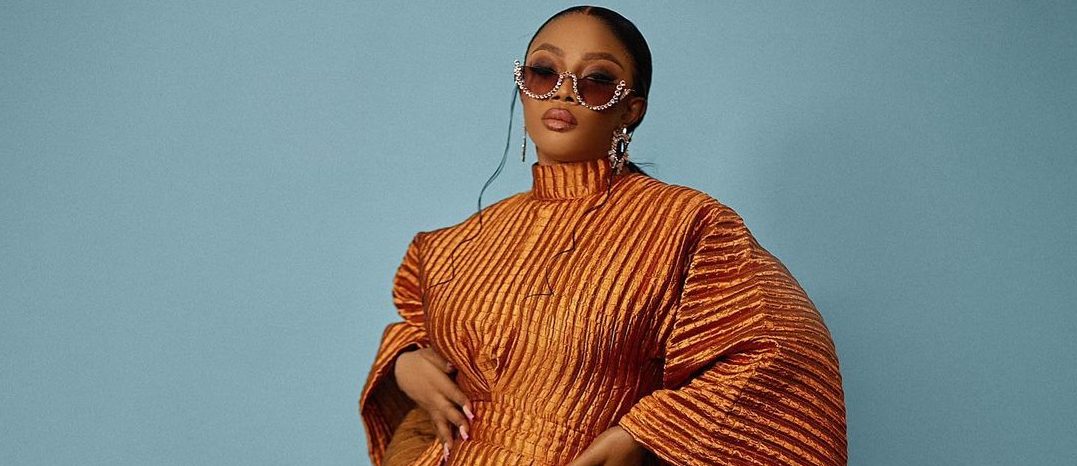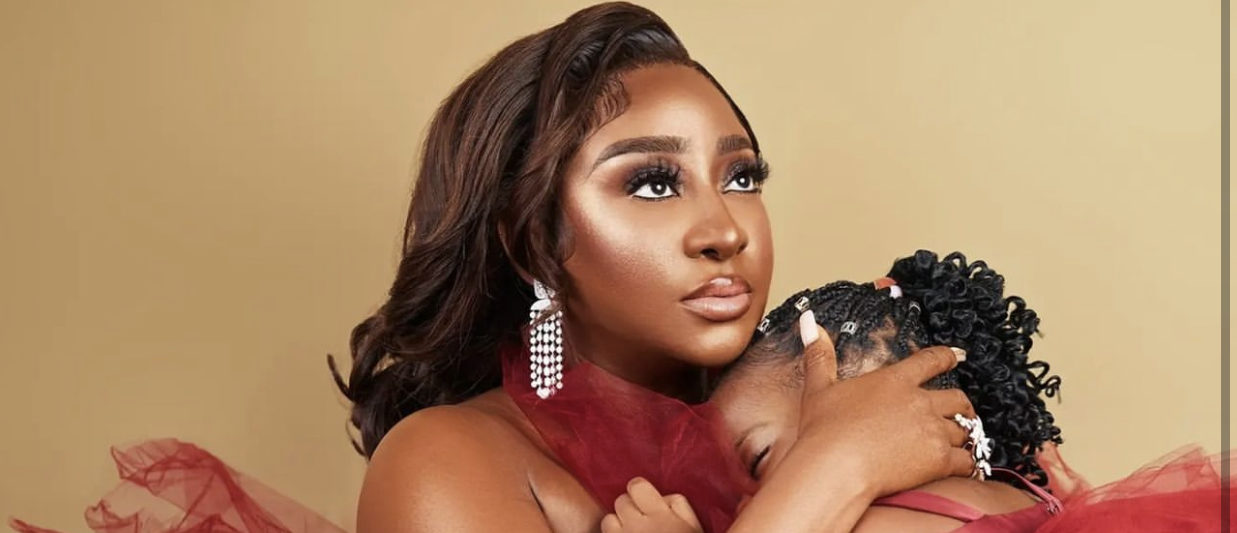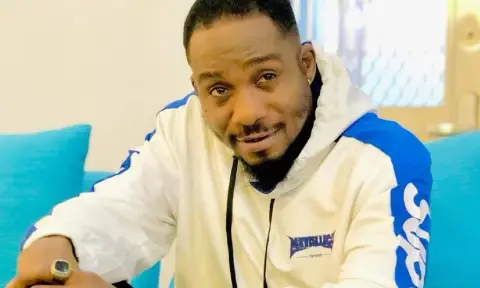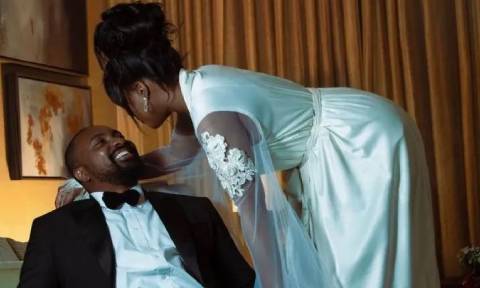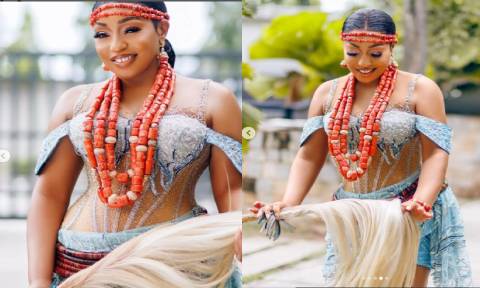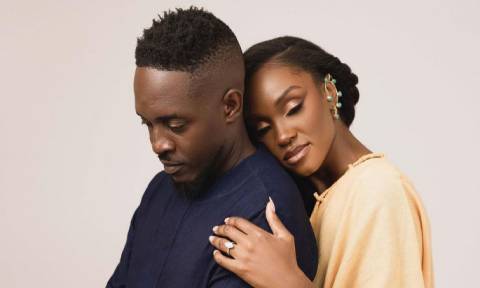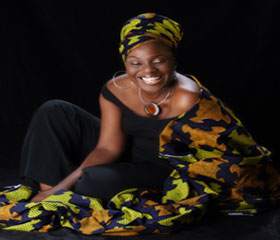
Joke Silva is, no doubt, a household name in Nigeria. One of the prime movers of the country’s home video and theatre industry, she packs both brain and regal beauty. The theatre icon and
mother of two is married to an equally accomplished thespian, Olu Jacobs. In an interview with ESTHER IJALANA, she speaks on the challenges of the industry, and her concern about the ship of state. Excerpts.
What sort of child were you while growing up?
My growing up years were quite interesting. I grew up in Yaba and Ikoyi. I have been an actress for the past 30 years. Right now, I run the Lufodo Grous, which is a production company. We produce plays, on the platform of radio, screen and theatre but we’ve done more for theatre than we’ve done for the other platforms. I am the Director of Studies for Lufodo Academy of Performing Arts. We have what is known as Lufodo Distribution. We also have Lufodo Consult where we use the performance skill to enhance corporate skills. You find out that a lot of organisations find the skills we have very useful, for instance in the area of team-building and in the areas of presentation.
We learnt that in your growing up days, you were a tomboy?
Who told you that?
When you were young, you used to ride bicycles around the city of Lagos?
Yes, but that does not make me a tomboy. There were several of us doing that. I mean most of us at that time had bikes because Ikoyi wasn’t so congested as it is now. So, we rode bikes to each others’ houses. Like the late Pastor Bimbo Odukoya, I used to ride to her house and she would ride to my house too. That’s it.
Have you always wanted to be an actress?
Yes, I have always wanted to be an actress. Though I deviated a couple of times, when I wanted to be a doctor, be a nurse, be a teacher and all that. But always, along the line, it was acting.
That was at what point?
Acting came right from my childhood. The doctor idea came in when I was in Secondary School but by the time I did my A level, it went by the way side and I was all into acting.
How did your family feel about you taking to acting?
Well, my family did not mind me going into it as a hobby. Initially, It was supposed to be a hobby. So, they were encouraging. But after then, it became professional and they were like, ‘Are you sure this is what you want to do?’ And they said, ‘OK.’ I tried to get into the University of Ibadan but then I came back from England very late, so they were like, ‘why don’t you just take a year out and work in this profession that you want to go into?’. I did that, I worked for a year. Then I went to the University of Lagos and did Performing Arts, and then to NTA in Victoria Island, then National Theatre, radio. I was working throughout. That was late 1980 and early ’81, I was working and I enjoyed myself, immensely. I think they were thinking that a year off would put me off, but I got more interested and they decided that I should go and formally train.
Was there anybody who inspired you into acting?
Definitely, and the one person I always talk about is Aunty Ibidun Allison. Because I remember watching her on Village Headmaster, and she would speak this serious pidgin-english and her being so troublesome. And when she was being interviewed on one magazine show in the late 60s, she was an incredible lady speaking very impeccable English. I was like, ‘Whao! I like that’, she is definitely one of the inspiration. I also love Hubert Ogunde’s wives as well, they were such incredible dancers, singers and actresses. I also love Duro Ladipo’s wives.
Apart from acting and Lufodo Production, what else do you do?
Is that not enough? I am running several companies at the same time, it’s enough
How did you become involved in “The Patriot,” the sitcom on NAFDAC?
I was invited by Chidi and Emeka Enyieocha. It portrays the character of a head of an institution. One of the early decisions we made then was that we were going to play it in such a way that she now becomes a role model for other people in running organisations of that type. Even though the character was based on the former NAFDAC boss, who is now the Minister of Information, Dora Akunyili, the decision was not to play her exactly, so that she is seen more as a role model for other agencies because of what she has achieved. I didn’t really get down into this deep thing, like her voice and manliness.
You are known to be selective in taking roles. What challenged you to take up this role?
It wasn’t as if I was challenged, its just that I like the story. I like the story of her achievements with an industry like that. You know, we just lose hope in Nigeria, we just believe that nothing can be done, like everything is bad and everybody is corrupt. For somebody who almost took a bullet for her work and it didn’t disturb her from continuing. It is a message of hope and I like stories that carry that kind of message. All over the world, people have been through times that are challenging, it doesn’t mean you have to stay in those times and situations. They can be stepping stones to push you further and take you to somewhere higher and better, so I like stories like “The Patriot” because it is a message of hope.
Which do you prefer, stage acting or movies?
I really don’t have a preference. I have found out that both have different challenges. They require different skills and so it is challenging to move from one to the other.
Which of them do you think brings out the best in an actress?
Well, some people think when you are on stage, it shows whether you can act or not. It’s not true. The challenges of telling the two are different, the challenges of television are different, the challenges of television is camera and it can start from anywhere in the story, there is no continuous progression when you are working, you can start from the middle of the story to the end before coming to the beginning. So, you as the performer must know the emotional grasp of the part you are playing because the director is worried about other technical things. He can’t start worrying about whether you are in the right emotional place. It’s your job to be in the right emotional place. The beauty of stage is that unlike camera, which can be very cold where you don’t get the response you get on stage, on stage you get fantastic response from your audience. The Nigerian audience are the best theatre audience in the world, they never keep quiet, they are totally involved in whatever you are doing. You will definitely know whether you are affecting them or not. They are very involved. However, the challenge of stage is that, you can not afford to make too many mistakes because it is right there in the open. If you make mistakes in the camera, it can be edited and you can retake, however, that doesn’t mean that it doesn’t have some tough challenges. I think some times some of the problems we have in this country that shouldn’t be is that, people sometimes say when you see this person you see them in a form and they are always the same. There are some people we call personality actors. They are people you call character actors. A personality actor was given the role because his personality is what is being sold to the audience, For instance, the last Genevive magazine that I read, someone like Ini Edo is exactly the same person like when you see her in real life. She is a personality actor. That is what is being sold to the audience and that is what the audience want to buy because they like it. But for actresses that are one thing today and totally different tomorrow, that is character acting, there are people like that and it doesn’t mean one is tougher than the other.
What can you say about some producers asking for sex from actresses before giving them roles?
You are talking about sexual harassment. Sexual harassment holds in all professions. If you are confident in God and you are confident in your talent, you don’t have to sleep with anybody to get to anywhere.
Have you ever found yourself in that situation?
Why? No
What is your take on issue of acting nude, especially as a woman?
Let’s put it this way: If being nude is an integral part of telling a story, then, it is very possible but it has to be an integral part of the story. A lot of times the less you see, the more effective it is; then you can then leave the audience to imagine. The reason I always say this with caution is that, I can remember when we were in drama school, there was a play that was done by one of the senior classes and the opening of the play had to do with this woman being absolutely nude on stage but covered with mud. It was amazing because we were all watching the play and nobody saw her nudity. Being nude was an integral part of the play, so it wasn’t an issue. But there are times when nudity is an embarrassment, when you shouldn’t have do it, because it is not necessary, in this case it becomes pornography.
What are the problems confronting the acting profession in Nigeria?
There are so many but there are two major things. Apart from the problems of Nigeria as a whole that makes life difficult in the country, we need to have a better system of distribution when it comes to film. We need a formal and open distribution system in Nigeria, though distribution system is being worked on and I believe in the next two years it shouldn’t be that much of a challenge. Another thing is capacity building for the industry. There are too many people out there, who don’t know what they are doing. It is making our progress slow, so they need a bit more training, people need to be a bit more skilled in what they are doing.
Looking at the large number of people going into acting now, do you think they have the quality that used to be in the profession?
The problem is the training, a lot of them have no skill. They have the energy, they are interested but they don’t have the skill. What the older people, as you mentioned, had was that they were working with people who knew what they were doing. But the younger people are working with people who don’t know what they are doing. They don’t have the skills and the people they are working with do not have the skills too. So, everybody just gets in-between a proper training.
What can you say on piracy?
That for me is not my problem. The issue of piracy is not my problem. It is a governmental problem. When the government has decided that it has lost enough revenue through piracy, then they it will do something about it. The government is up to the task to do something about it so why should I give myself a headache? They know exactly what to do about it, they know.
Since the government does not appear to have done much, what can the industry do about it?
The industry is doing what it has always done: It has continued to do the work. After a while, when everybody has lost enough money, the industry will fail and the government can be very pleased once again that they have destroyed another industry. They destroyed the manufacturing industry, so they can destroy Nollywood as well.
Looking at the entertainment industry generally, do you think it is growing ?
Yes, it is. I like the idea that it is a lot of work that we do. For example, the success of Nollywood is seen by the fact that it tells human-angle stories. In our history, we have been very lucky that we do not have to carry the baggage of racism in our stories, we do not have to be burdened with having to apologise or emphasise the fact that we are black. We are just fortunate that that is the kind of history we have and so we can tell our stories without having to carry that baggage. Very few countries in Africa can do that, very few Africans in the diaspora can do that. That is why Nollywood is successful. Look at our music industry for example, it is fantastic. We have taken all genres of music and we have made ours. No matter what music, whether it is reggae, whether it is R&B; whatever it is, we have Nigeria. It is giving the entertainment world a totally different playback. We have beautiful traditional dances to interpret all kinds of dance and it is exciting. What our choreographers are doing with dance is also great, they are using dance to tell a story, that’s very entertaining and socially relevant.
What was your first time on stage like?
As a professional, it was at the University of Lagos Performing Arts Centre. I was very excited. Whenever I am performing, even till now, I just get totally energised and I am more alive. If I am alive at the scale of entertaining, I am alive when I get on stage. I was excited as a beginner and it is still the same now.
What are some of the challenges you have faced as an actress?
I think some of the challenges will have to be that, like I said, in the earlier years you were working with people who knew exactly what it was that they were doing, and so they could help you and guide you. Because you were working with people who knew what they were doing, you would also know what you were doing, and so you were robbing minds and creating entertainment with a collaborative effort, whether it was music, dance, screen or stage. All these need people who know what they are doing so as to collaborate and come out with something exciting. However, in the last couple of years, it has been working with people who don’t know what they are doing and sometimes because they don’t know what they are doing, it kind of makes one look bad. There are some who do not know what they are doing, and when you see some of the parts they do, it can be very upsetting. That is quite a tough one. Even when you know capacity building is one of the challenges the industry has, and you sort of bring up an institution that can help to train people, raising the fund is not easy because what the banks are charging for facilities needed to run such an institution is too much. The interest percentage is high for an educational institution like that, because of what you want to achieve and the kind of field it is, you can not expect the school fees to cover it , people will not be able to afford it.
Which of your works brought you limelight?
From the screen, it would be ‘Mirror in the Sun’ and ‘Second Chance’ that brought me into the limelight. They were the ones that got the attention of the audience film-wise; that brought one to the platform of popularity, that’s for the screen. For the theatre, it is ‘The King Must Dance Naked’.
How long have you been married?
I have been married for 25 years. I got married in 1985
That is a long time
I don’t think so. I mean we have people who have been married for 50 years. I find it really amasing because nowadays you find people who have been married for 19 years and you see this amazing clap for them. What about those who have been married for 50 years?
The point is this, you are an actress, married to an actor. Celebrity marriages hardly last. For you to have kept the marriage 25 years on, is a lot
Don’t even go there. The only reason people are talking about celebrity marriages that don’t work is because they are the ones in the limelight. You find medical doctors, lawyers or teachers who are married and it doesn’t last. It is simple because the people in the entertainment are in the limelight. The number of divorces that is going on in other industries is just as high, if not higher.
Considering the nature of your job and that of your husband, which involves a lot of travelling, how do you find time for the home front?
It is hard, but the truth is there are down times, work-wise. So you try to spend 100 percent of such down-times with the family. At the moment, school fees are amazing, so whether you like it or not you have to work, work hard and work smart. I wish I had more time, and I am praying to God that in the next two to three years, I will. I try to make the best of what I have now and spend quality time with my kids
Can you share with us some of the challenges you have encountered in your marriage?
No, I think I am entitled to a private life. I am not going to discuss that.
Who is Joke Silva outside acting?
I can’t tell you. I don’t know. It is other people who can tell you. I am just me, like all people I react to situations that I find myself in, I just do my work, I have a family. It is other people who will tell you who I am, I don’t know.
Are you an introvert?
No, why?
Because you are hardly seen in social events and gatherings?
Yes, but that does not make me an introvert. It just means that I don’t like social events. You are in the limelight so much and you just like to have a bit of private life. If it is not necessary, why do you have to be present because you are always in the public glare? That kind of anonymity is the huge price that you pay for your work, you accept it. That it is your occupational hazard. Why must I then increase the visibility?
What do you have phobia for?
I hate snakes. That is my phobia anyday, anytime. I can walk through anything but snake, no.
What is your definition of style?
Elegance and comfortable
What is your favourite food?
Traditional amala, ewedu and fresh fish. Western seafood lobster
Your favourite colour?
The rainbow! I like any colour
Are you a religious person?
I am a Christian but I am not a religious person.
What is your definition of being religious?
Being religious is going to church everyday but it doesn’t affect the way you think and behave, fulfilling all righteousness and yet it doesn’t affect your life in anyway. I pray I don’t want to be religious. There is a temptation to become religious, because you sometimes think those are the things that ought to be done, instead of getting a personal relationship with God. It is good to be with the body of Christ, it energizes you and helps you to face challenges, it is very difficult to do it on my own, I find out that being with the body of Christ helps me but I also don’t want to be stuck in just fulfilling all righteousness and not having that personal relationship with my Lord. I want to be on fire and when I am dead I am permanently looking for the fire, how to get it back.
What advice do you have for the Nigerian youth?
Life is fun but life is more fun when you have a vision. Life is even more interesting when you think of what you can contribute to make whatever your own case is better, it is even more meaningful. Then you will find out that by the time you are in your 50s, you will have achieved quite a lot.
Any advice for our leaders?
They don’t need advice, they should stop stealing. I hate going in that area, because it has become a situation where it is a competition of who has stolen the most. It not just stealing. It has now become, ‘You stole N5 billion. Is that all? I got away with N10 billion or N20 billion’. It is sickening, because we are in a country where six million people start nursery school and at the end of the day only half a million end up in tertiary institution, and one individual will be happy to have 600 houses in Nigeria, 600 houses in Dubai. It is insanity. We have hospitals that cannot carry out simple operations. When you say you are going to LUTH or any government hospital, you pray, you fast so that you can come out alive, which is insanity. You have a President, may his soul rest in peace, who had to be flown out of the country. If all the money the idiots are spending in other people’s countries for their health is put it in this country, we will have one of the best medical care in the entire world. Please, there is no advice for them, don’t just let me start. We just have an insane ruling class, that’s all.
How rewarding is the acting profession?
How rewarding is any profession in Nigeria to anybody? Except you are in a place where you can sign for as much money as possible. It is rewarding because you are doing what you love. Is it materially rewarding? Even if it is materially rewarding, there are many linkages that by the time you’ve paid for your petrol, paid for your water, paid for this and that. It is rewarding because you are doing what you love.
